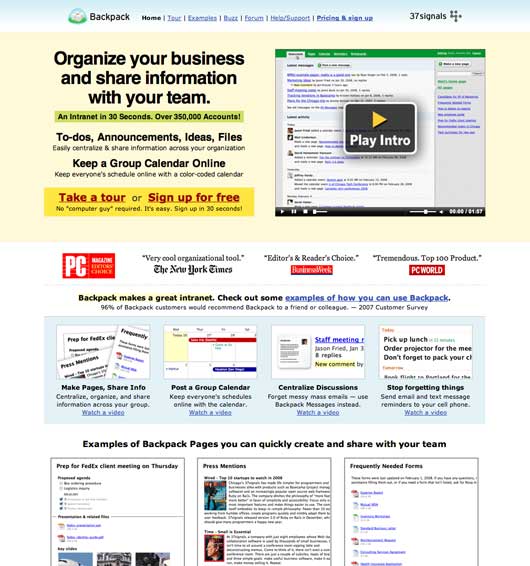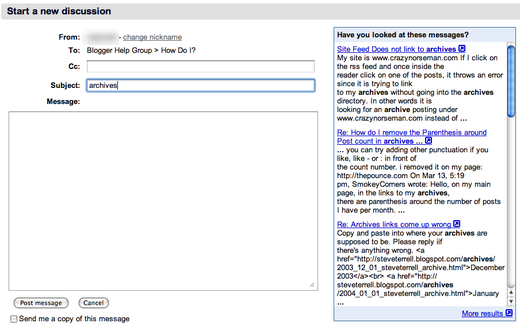Recipes tell you nothing. Learning techniques is the key.
Chef Tom Colicchio when asked about his most-used cookbook
You’re reading Signal v. Noise, a publication about the web by Basecamp since 1999. Happy !
Recipes tell you nothing. Learning techniques is the key.
A few weeks ago we launched the new Backpack marketing site. This completes the redesigns of our four top product sites (Basecamp, Highrise, Backpack, and Campfire) as well as the 37signals site. More on the 37signals.com redesign in another post.
I wanted to share the thought process and some of the design decisions we made while redesigning the Backpack site. Even though the Backpack site feels part of the Basecamp, Highrise, and Campfire design family, it’s the most unique of the four.

This was the old Backpack marketing site. It had been this way for a couple of years. It served the product well, but not well enough. The main weakness was a lack of focus.
Backpack is a swiss army-like product. It actually does a lot of things. You can use it to take notes, create to-dos, share files, share photos, create pages, set SMS reminders, collaborate on mini projects, keep track of who’s working on what, and view and share calendars and schedules. While all of this has been a strength, how we attempted to explain it was a weakness.
The old home page tried to expose it all. We wanted to flash the world with Backpack’s entire body. So we talked about notes and lists and calendars and reminders and pages, etc. It all made for an unfocused message.
So instead of just taking the old content and repurposing it in a new design, we tossed it all out and started over. We asked ourselves: What is Backpack really about? What’s the core? What does it do better than anything else it does? What would it miss the most if it was gone?
Continued…Why don’t we just call plans what they really are: guesses. Unless you’re a fortune teller, long-term business planning is a fantasy. There are just too many factors that are out of your hands: market conditions, competitors, customers, the economy, etc. Writing a plan makes you feel in control of things you can’t actually control.
In fact, you might as well change the name of your business plans to business guesses, your financial plans to financial guesses, and your strategic planning to strategic guesses. Do that and you’ll probably start putting a lot less weight into those things.
Ian MacMillan, Wharton professor of innovation and entrepreneurship, and Rita Gunther McGrath, a professor at Columbia Business School, believe “the only plan is to learn as you go.” They say 1) conventional approaches and planning don’t work when you’re trying to get into new spaces, 2) assumptions are what get most companies into trouble, and 3) it’s not failure that companies need to avoid, but rather “failing expensively.”
Here’s an example: You want to get money for a project. You put together a PowerPoint deck of 100 slides with all these back-up details and all these spreadsheets. You go to whoever has the resources and you make this big pitch. And then they say, “Okay.”
You set off, and in two or three months you discover that the market wasn’t exactly what you thought, and the service delivery requirements aren’t exactly what you thought, and maybe the product needs to be tweaked. Now, you’ve got this huge commitment that you’re supposed to live up to. So the first dilemma that we see in companies that causes them to fail so systematically is this presumption that you can be right in a world of massive uncertainty. That leads to these kinds of dysfunctional behaviors.
Great way to put it there: Stop presuming you can be right in a world of massive uncertainty. The only plan you should make is to plan on improvising.
When someone demands to know how we are going to replace newspapers, they are really demanding to be told that we are not living through a revolution. They are demanding to be told that old systems won’t break before new systems are in place. They are demanding to be told that ancient social bargains aren’t in peril, that core institutions will be spared, that new methods of spreading information will improve previous practice rather than upending it. They are demanding to be lied to. There are fewer and fewer people who can convincingly tell such a lie.

Submit a request to Blogger’s Help Forum and live search results guide you to potentially related FAQs. Smart attempt to head off customer questions at the pass and deliver answers immediately (without any human intervention). If it works, that is.
Vic Firth came up with the idea of making a better drumstick while playing timpani for the Boston Symphony Orchestra. The sticks he could buy commercially didn’t measure up to the job so he began making and selling drumsticks from his basement at home. Then one day he dropped a bunch of sticks on the floor and heard all the different pitches. That’s when he began to match up sticks by moisture content, weight, density, and pitch so they were identical pairs. The result became his product’s tag line: “the perfect pair.” Today, Vic Firth’s factory turns out over 85,000 drumsticks a day and has a 62 percent share in the drumstick market.
Les Paul invented the solid body guitar because his audience at a BBQ joint couldn’t hear him play.
I was appearing in person playing outdoors at a place called Goerke’s Corner. That was halfway between Waukesha and Milwaukee, and it was interesting because the people would drive in to get their barbecue sandwiches and their root beer, or whatever. I would play and sing for them, and one fellow sitting in a rumble seat of a car wrote a note to me and gave it to the car hop. She brought it to me and it says, “What you got going up there…I can hear your voice and your harmonica fine and I enjoy it, but the guitar is not loud enough.” That made me go home and think about it, and in my own simple way, I said, “Well, now, let me investigate the guitar.” I first tried filling it up with rags, and I ended up with Plaster of Paris in it.
Alain Mongeau, Mutek’s founder and director, explains how Robert Henke came up with Ableton Live:
An artist like Monolake [techno producer and sound artist Robert Henke] is a perfect example. For instance, he’s always wanted to make the kind of music that he was imagining, but there was no way to make it happen. So he actually pushed and pushed and pushed and finally created the tools to make that music, which ended up being Ableton Live software, something that’s obviously had a tremendous impact on this whole field in the last ten years.
These musicians had a problem. They went out and solved it. And it turns out there were tons of other people out there who wanted the same solution.
We associate great ideas with lightning strikes. But the truth is a lot of great inventions come from dull aches. What’s hurting you? And how can you fix it? There might be a big crowd out there who wants that solution too.

Neat visual nav at Stylous.com. Check it out in action to see how it works.
Some recent posts at the 37signals Product Blog:
Campfire
Sparkflare pipes tweets and web feeds into Campfire
Sparkflare is a new Extra that pipes tweets and web feeds into a Campfire room. “Our team lives in Campfire and we want all of this information to come to us. We wrote Sparkflare to make this happen — for us, and for you.”
Ember 1.1 is now available (at a discounted price for the next week)
New features, discounted price for the next week. “Ember is a group chat client that allows you to use Campfire™ by 37signals® anywhere you go. Now in a native iPhone app you can chat effortlessly with groups large and small.”
Backpack
More examples, improved help, and Extras at the new Backpack site
As mentioned previously, there’s a new look for the Backpack marketing site. You’ll now see more Examples of all the different ways you might use Backpack. We’ve also improved the organization in the Help section so that you can find answers to your questions more quickly. You can also check out all the Extras and iPhone Apps for Backpack in one place.
Politifact just won the Pulitzer Prize for National Reporting for its coverage of the 2008 election. The board cited PolitiFact’s use of “probing reporters and the power of the World Wide Web to examine more than 750 political claims, separating rhetoric from truth to enlighten voters.”
Matt Waite, one of the site’s founders, posted about the big win and the key lesson he learned building PolitiFact: Demos, not memos. [thx JB]
Demos, not memos.
To be clear, my bosses thought PolitiFact was a good idea from the start. But there was a material difference between how they reacted to memos and how they reacted to seeing it working.
The sales job got easier. The abstract became concrete. The conversations changed from “what do you mean by” to “what if we did this.”
Some of the Getting Real-ish reasons Waite gives for this “demos, not memos” approach: 1. Ideas are cheap and plentiful. Execution is hard. 2. Meetings suck. 3. Requirements documents suck.
(Waite also links to “Why requirements stink” which offers this great example: “Here’s a requirements list: Make a $5 car that goes 500 miles per hour, weighs 10 lbs, and is invisible.”)
Think about how much time you would waste trying to explain the screen shown above. Just build the damn thing and then everyone gets it. Create instead of debate. That’s how you get from “huh?” to “aha.”
I actually think that there was always an unsustainable feel about what had happened on Wall Street over the last 10, 15 years, and it’s not that different from the unsustainable nature of what was happening during the dot-com boom, where people in Silicon Valley could make enormous sums of money, even though what they were peddling never really had any signs it would ever make a profit.
That doesn’t mean, though, that Silicon Valley is still not a huge, critical, important part of our economy, and Wall Street will remain a big, important part of our economy, just as it was in the ’70s and the ’80s. It just won’t be half of our economy. And that means that more talent, more resources will be going to other sectors of the economy. And I actually think that’s healthy. We don’t want every single college grad with mathematical aptitude to become a derivatives trader. We want some of them to go into engineering, and we want some of them to be going into computer design.